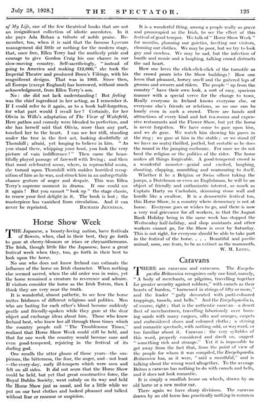Horse Show Week T HE Japanese, a beauty-lovin g nation, have festivals
of flowers, when, clad in their best, they go forth to gaze at cherry-blossom or irises or chrysanthemums. The Irish, though little like the Japanese, have a great festival week when they, too, go forth in their best to look upon the horse. No one who does not know Ireland can estimate the influence of the horse on Irish character. When nothing else seemed sacred, when the old order was in ruins, yet the horse remained a creature to reverence and admire. If visitors consider the horse as the Irish Totem, then I think they are very near the truth. It is wonderful, almost pathetic, to see how the horse unites Irishmen of different religions and politics. Men who are lusting for each other's blood become suddenly gentle and friendly-spoken while they gaze at the dear object and exchange ideas about him. Those who know Ireland best, who knew her all through those times which the country people call " The Troublesome Times," realized that Horse Show Week could still be held, and that for one week the country would become sane and even good-tempered, rejoicing in the festival of its darling god. One recalls the utter gloom of those years—the sus- picions, the bitterness, the fear, the anger, and—not least —the every-day, surly ill-tempers which were seen and felt on all sides. It did not seem that the Horse Show could be held, but yet that great constructive force, the Royal Dublin Society, went calmly on its way and held the Horse Show just as usual, and for a little while we put on our best clothes and looked pleasant and talked without fear or rancour or suspicion. It is a wonderful thing, among a people really so grave and preoccupied as the Irish, to see the effect of this festival of good temper. We talk of " Horse Show Week " for months, planning our gaieties, inviting our visitors, choosing our clothes. We may be poor, but we try to look gay and careless. We may be sad, but the infection of bustle and music and a laughing, talking crowd distracts the sad heart. How one loves the click-click-click of the turnstile as the crowd pours into the Show buildings ! How one loves that pleasant, horsey smell and the gaitered legs of grooms and owners and riders. The people " up from the country " have their own look, a sort of easy, spacious manner with a special verve for the change to town, Really everyone in Ireland knows everyone else, or everyone else's friends or relations, so no one can be lonely even in such a crowd. There are bands and attractions of every kind and hot tea-rooms and expen- sive restaurants and the Flower Show, but yet the horse is never forgotten. We have come to gaze upon him, and we do gaze. We watch him showing his paces in the ring ; we gaze at him in the stable ; or we stand (if we have no seats) thrilled, jostled, but ecstatic as he does the round in the jumping enclosure. For once we do not heed the religion or the politics of the rider. The horse makes all things forgivable. A good-tempered crowd is a wonderful monster—genial and excited, laughing, shouting, clapping, mumbling and murmuring to itself. Whether it be a Belgian or Swiss officer taking the jumps, a Dutchman or even an Englishman, he will be an object of friendly and enthusiastic interest, as much as Captain Harty on Cuchulain, skimming stone wall and hurdle like a swallow. It is a democratic festival too, this Horse Show, in a country where democracy is not at home. Everyone goes or wishes to go, and there is now a very real grievance for all workers, in that the August Bank Holiday being in the same week has stopped the Wednesday half-holiday, and shop assistants and other workers cannot go, for the Show is over by Saturday. This is not right, for everyone should be able to take part in the festival of the horse. . . . Beautiful and pacific animal, soon, one fears, to be as extinct as the mammoth. W. M. Lows.




































 Previous page
Previous page